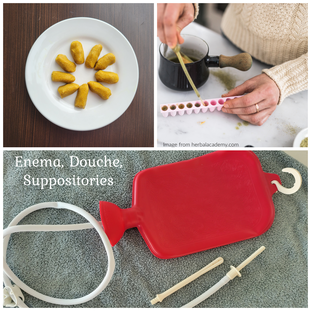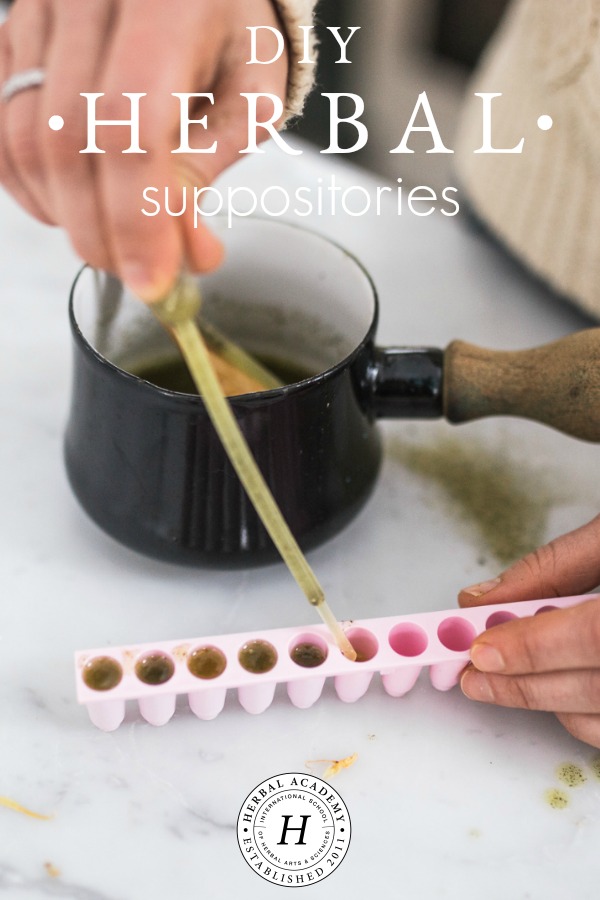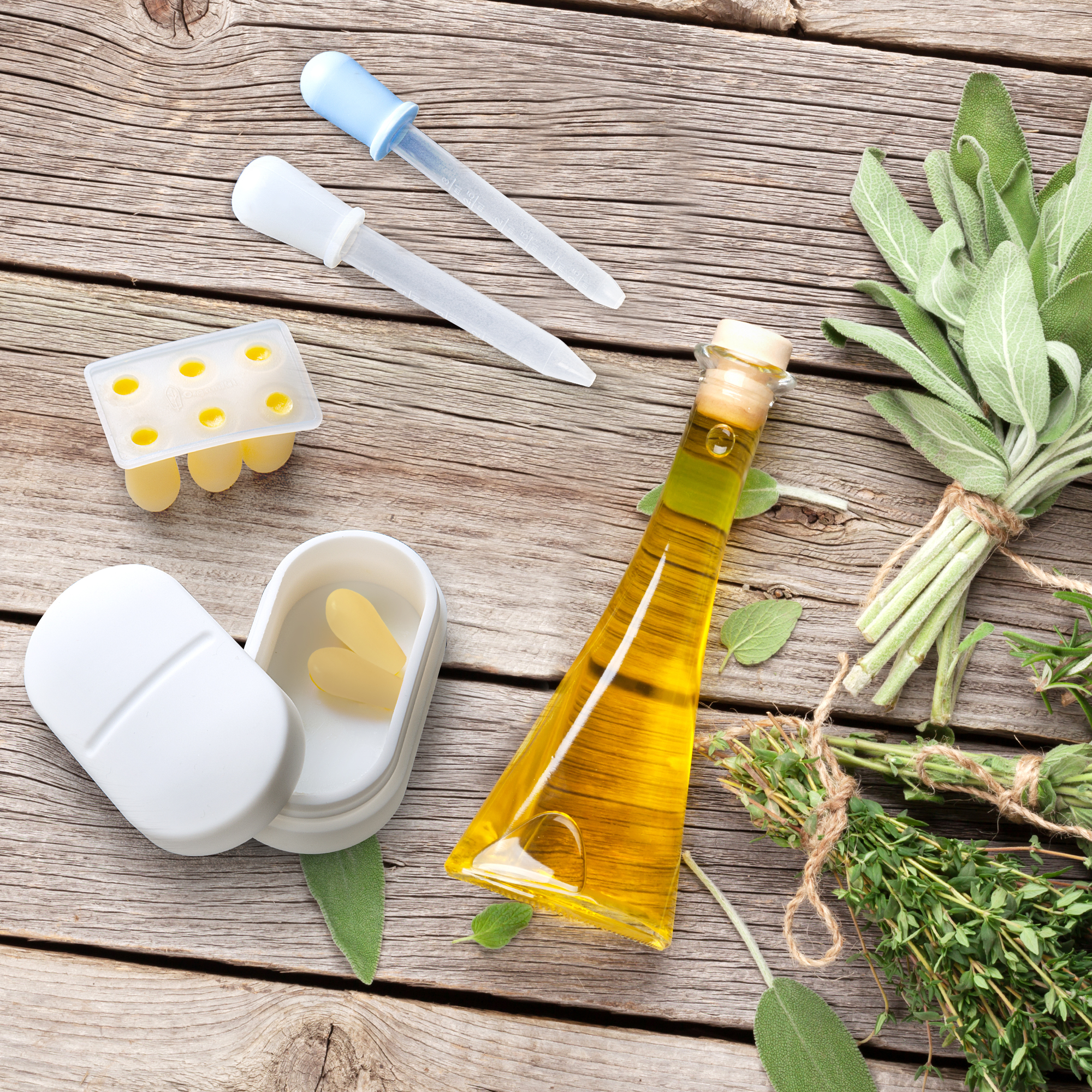Used to get herbs right up against or as close as possible to lower parts of the body such as the vagina, prostate, and colon, while readily being absorbed into the bloodstream, similar to taking them orally. These methods are used to for hemorrhoids, tumors, lesions and cysts, to treat infection, inflammation, and fever, while nourishing, soothing, and toning these systems. These methods can also be used to get herbs into the body in persons who cannot (or will not) take them orally, such as infants, young children, the elderly, special needs, etc.
Enema
Enemas have been used to cleanse the colon, flush out toxins, soothe inflammation, and to get nutrients into the body where they can be readily absorbed. As the bowels are cleansed and toxins removed improvement has been seen with fevers, coughs, congestion, headache, flu, diarrhea, sore throats, and even earaches. Dr. Jethro Kloss defined 4 types of enemas:
Preparations:
Enema kit (a variety of options to purchase) or syringe bulb for babies and children
1-2 quarts of distilled water or solution of choice (see below)
Lubricant (petroleum jelly, olive oil or a mild salve)
Time (you want to stay by a toilet afterwards so plan accordingly)
Instructions:
You can find instructions on how to perform an enema on the box of your enema kit, from google, or from your medical provider. I have loved the detailed instructions from Dr. Jethro Kloss’s book, Back to Eden as well as the instructions for children from the book The ABC Herbal by Steven H. Horne. These are a combination of both with a dash of Dr. Christopher.
- Ordinary enema: uses a small amount of fluid to cleanse the rectum and lower colon.
- Astringent enema: taken to relieve inflammation in diarrhea, dysentery, etc.
- Nourishing enema: getting nutrients into the body quickly (small doses, through a bulb).
- High enema: given to thoroughly cleanse the entire length of the colon. Instructions below are for a high enema.
Preparations:
Enema kit (a variety of options to purchase) or syringe bulb for babies and children
1-2 quarts of distilled water or solution of choice (see below)
Lubricant (petroleum jelly, olive oil or a mild salve)
Time (you want to stay by a toilet afterwards so plan accordingly)
Instructions:
You can find instructions on how to perform an enema on the box of your enema kit, from google, or from your medical provider. I have loved the detailed instructions from Dr. Jethro Kloss’s book, Back to Eden as well as the instructions for children from the book The ABC Herbal by Steven H. Horne. These are a combination of both with a dash of Dr. Christopher.
- Before beginning the enema prepare a bed or your floor as your area of application. If using a bed put a plastic sheet or waterproof material over it, then cover with towels. If using the floor, lay out a towel with extras close by.
- Follow the instructions for filling your particular enema kit with solution or if using a bulb for a child, fill the bulb with the enema solution by squeezing and sucking up the solution and then turn it upright and squeeze any remaining air out. Finish filling with solution.
- Lubricate the anus and the tip of the syringe or bulb with your lubricant of choice. Start the solution while lying flat on your back, on the prepared bed or floor.
- For syringe bulb use with children, gently insert the tip of the syringe into the anus and gently squeeze. Make sure to not suck as it is withdrawn. Wait a few minutes and if nothing comes out add a little more solution every five minutes until the bowels release to a soft stool. This may need to be repeated several times.
- For adults, insert the enema tip several inches into the rectum. Allow the solution to flow slowly and when you start to feel full, turn off the flow.
- Immediately turn halfway onto the left side and when the pressure eases start the flow again and let as much run in as possible. Again, when you feel full turn off the flow and turn all the way onto the left side for several minutes.
- Start the flow again and slowly turn onto the back and then to the right until all the way on the right side. Let as much solution as possible flow in while in this position until you feel full then turn off the flow.
- Turn further to the right almost onto the stomach and stay for several minutes, then turn onto the back once more. Remove the enema tip.
- Dr. Kloss suggests repeating this process until the returns are clear, maybe several times. The purpose for rolling from side to side is so the solution is able to run through the entire colon, even if a “kink” is present.
Enema Solutions
Garlic Tea Solution:
¼ teaspoon garlic powder per cup of water (made as a tea strain with a fine cloth) or
1 clove, minced garlic per pint of water (made as a tea, strain all particles) or
1/2 teaspoon garlic oil per cup of water
Herbal Tea Solution:
1 tsp. to 1 Tbsp. herb per cup of distilled water
Catnip is a good basic herb of choice unless you have a specific herb you want to use.
Bring distilled water to a boil and pour over cut herb. Steep for 30 minutes. Strain the herb and set in refrigerator until tea is cooled to preferred temperature. Pour into enema bucket or bag. For a child, use half the amount.
¼ teaspoon garlic powder per cup of water (made as a tea strain with a fine cloth) or
1 clove, minced garlic per pint of water (made as a tea, strain all particles) or
1/2 teaspoon garlic oil per cup of water
Herbal Tea Solution:
1 tsp. to 1 Tbsp. herb per cup of distilled water
Catnip is a good basic herb of choice unless you have a specific herb you want to use.
Bring distilled water to a boil and pour over cut herb. Steep for 30 minutes. Strain the herb and set in refrigerator until tea is cooled to preferred temperature. Pour into enema bucket or bag. For a child, use half the amount.
Solution Temperature:
There are differing opinions from herbalists on what temperature your solution should be. I believe this goes back to Lesson 1 where every “body” is different and we should take into consideration the condition we are treating and the person’s constitution. I will share what two respected herbalists’ have to say then invite you to use your gift of discernment for which way feels right for your unique situation.
Cold enemas (Dr. Christopher) - “A cold enema will cause the anus and rectal area to contract and retain the fluid until it warms to body temperature. It will then cause the area to relax and void the fluid and fecal matter. If the patient has a fever, the body will hold the enema longer until the fluid reaches the body’s heated temperature. This allows the liquid to stay in the body longer, permeating more dried waste matter and loosening it.”
Warm enemas (Dr. Jethro Kloss) – “The material used for the enema, whether water, herb tea, etc., should be about body temperature. Otherwise, the colon becomes irritated and contracts, causing cramps and making it difficult or impossible to retain the solution.”
There are differing opinions from herbalists on what temperature your solution should be. I believe this goes back to Lesson 1 where every “body” is different and we should take into consideration the condition we are treating and the person’s constitution. I will share what two respected herbalists’ have to say then invite you to use your gift of discernment for which way feels right for your unique situation.
Cold enemas (Dr. Christopher) - “A cold enema will cause the anus and rectal area to contract and retain the fluid until it warms to body temperature. It will then cause the area to relax and void the fluid and fecal matter. If the patient has a fever, the body will hold the enema longer until the fluid reaches the body’s heated temperature. This allows the liquid to stay in the body longer, permeating more dried waste matter and loosening it.”
Warm enemas (Dr. Jethro Kloss) – “The material used for the enema, whether water, herb tea, etc., should be about body temperature. Otherwise, the colon becomes irritated and contracts, causing cramps and making it difficult or impossible to retain the solution.”
Douche
Douche is a French word meaning wash or soak. This method washes out the vagina while applying herbs directly to the source for infections, cysts, prolapse uterus, and other vaginal conditions.
- Make a concentrated tea by doubling the amount of aerial parts for an infusion or simmering a decoction down to half its original amount.
- Use a slant board or arrange pillows so you can lie head down with the bottom raised.
- Fill a douche bag or syringe with herbal tea, about ¼ to ½ cup.
- Inject the douche into the vaginal opening and gently press the bag or push the syringe bulb.
- Leave in as long as possible before voiding.
- During the procedure, massage the pelvic and abdominal area to help the herbal tea assimilate into the uterus.
Suppository/Bolus
A suppository is defined as something that is "placed underneath," designed to penetrate and dissolve in a body cavity other than the mouth, while a bolus is "a rounded mass of anything", a large pill, lump, or clod. Generally, we refer to a bolus as a suppository, but they are really used interchangeably. Herbs are added to a solid base that will dissolve and disperse when in contact with body tissue. These can be inserted into the vagina or the rectum depending on what you want to treat. Suppositories work like a salve, giving a prolonged administration and absorption of herbs in contrast to the instant absorption or flushing of a liquid tea with an enema or douche.
Basic Suppository Recipe:
¼ cup cocoa butter
¼ cup coconut oil
1 tablespoon olive oil (or use an herbal oil)
2 tablespoons powdered dried herbs
Combine cocoa butter and oil in a small saucepan, melting them over medium heat, stir to combine and remove from heat. Add the infused oil and herbs, stirring well. Pour the mixture into suppository molds and refrigerate until firm. Store in the refrigerator or freezer until ready to use.
Basic Bolus Recipe:
Mix powdered herbs with melted coconut butter and roll together until a pie dough consistency is achieved. Roll the entire “dough” out worm like, until the size of your finger. Cut in 1-inch-long lengths. Place on a tray in the refrigerator until solid. Keep stored in the fridge or freezer.
Insert into vagina or rectum as needed before going to bed so the body is in a horizontal position. Line the underwear with a pad or thick cloth to catch any drip out.
Basic Suppository Recipe:
¼ cup cocoa butter
¼ cup coconut oil
1 tablespoon olive oil (or use an herbal oil)
2 tablespoons powdered dried herbs
Combine cocoa butter and oil in a small saucepan, melting them over medium heat, stir to combine and remove from heat. Add the infused oil and herbs, stirring well. Pour the mixture into suppository molds and refrigerate until firm. Store in the refrigerator or freezer until ready to use.
Basic Bolus Recipe:
Mix powdered herbs with melted coconut butter and roll together until a pie dough consistency is achieved. Roll the entire “dough” out worm like, until the size of your finger. Cut in 1-inch-long lengths. Place on a tray in the refrigerator until solid. Keep stored in the fridge or freezer.
Insert into vagina or rectum as needed before going to bed so the body is in a horizontal position. Line the underwear with a pad or thick cloth to catch any drip out.




